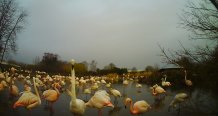articles

Trail cameras were installed around the greater flamingo’s enclosure at Slimbridge Wetland Centre to observe the flock’s activity around the clock
Flamingo expert wins zoo research award
A University of Exeter scientist has won a gold award for his research into the nocturnal behaviour of flamingos.
Dr Paul Rose, lecturer at the University of Exeter and research associate at the Wildfowl & Wetland Trust (WWT), won the top prize in the 2019 British & Irish Association of Zoos and Aquariums (BIAZA) Research Awards for best zoo research project in the UK and Ireland.
The project, titled: An evolution of flamingo nocturnal activity, began in 2016 and built on Dr Rose’s previous BIAZA award-winning research project that looked at flamingo friendships.
Until recently, little research had been done on nocturnal behaviour and enclosure usage after the zoo staff have gone home.
“This science hadn't been done before in a zoo on these birds,” said Dr Rose.
“There is a need for more behavioural monitoring of zoo animals over-night to ensure their welfare is good. Just because the scientist and the zookeeper goes home at 5pm, for example, it doesn't mean the birds stop being active. So we wanted to take our science into their whole 24-hour cycle.
“There is some literature on wild flamingos that shows them to remain active overnight, feeding and foraging, and we wanted to see if this was true for our collection birds.”
The joint project took place at Slimbridge Wetland Centre, where trail cameras were installed around the greater flamingo’s enclosure to observe the flock’s activity around the clock.
The results showed that flamingos can be more active in the evening and overnight compared to daytime, and they use much of their enclosure overnight.
This research can now be used to encourage more zoos to invest in their flamingo exhibits to enable birds to move around during the day and at night by improving night-time housing which can restrict activity when they are housed indoors.
Dr Rose explains: “The large flock size and natural-style enclosures for the WWT birds makes them an excellent study population, and we showed that our greater flamingos match the wild literature – with lots of foraging occurring in the late evening and very early morning.
“We continued this research on the lesser flamingos in 2018 and on the Andean flamingos when they were fostering their chicks last summer. These birds too have a diverse behaviour pattern after dark, and our data is really helpful in developing how we manage flamingos both here at WWT and for other collections too so that they can ‘be a flamingo’ all hours of the day and night.
“It's really great that the University of Exeter's flamingo research has been instrumental in the achievement of this Gold Award for research because it shows how good captive flamingos are for answering questions that are important to both our understanding of animal behaviour and our development of animal husbandry.
“Doing research really adds value to why we keep flamingos and it shows visitors to WWT centres that the birds are at the heart of current science.
“It's great to be recognised by BIAZA for the quality and impact of our research contributions, and this shows the value of collaboration between universities like Exeter and conservation centres like WWT. I hope the flamingos are proud of it too!”
Read more about the research here
Date: 25 June 2019